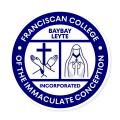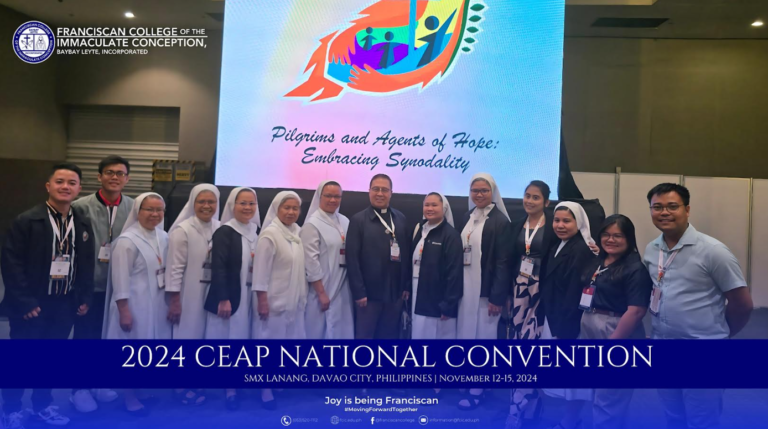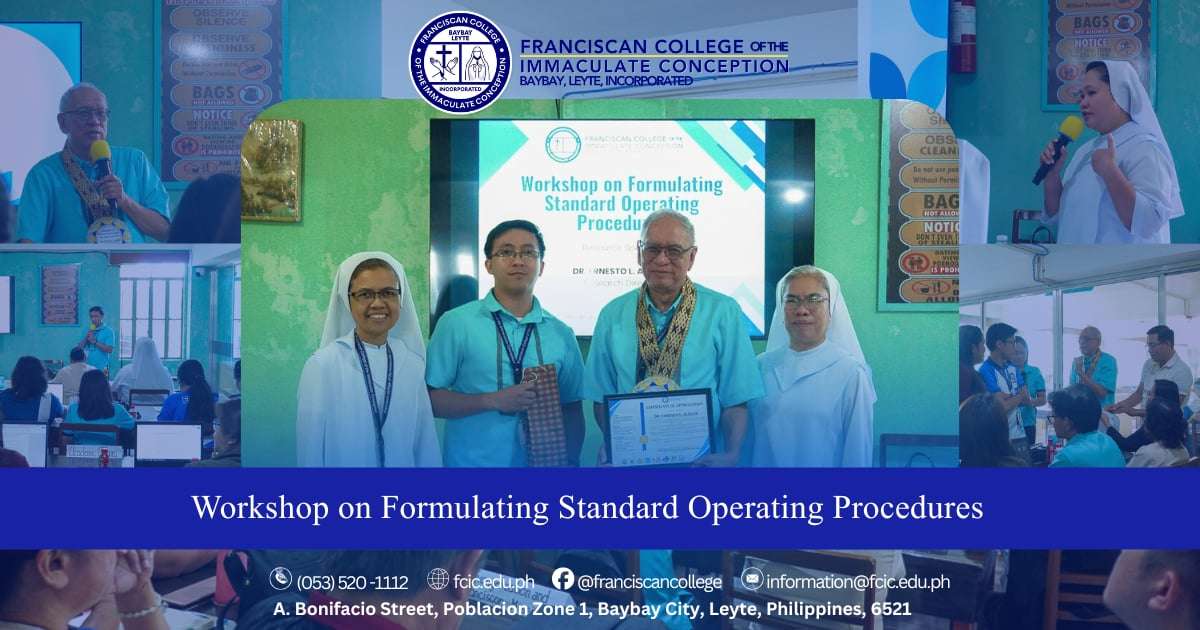The Franciscan College of the Immaculate Conception (FCIC) proudly joined the 2024 Catholic Educational Association of the Philippines (CEAP) National Convention held in Davao City from November 12-15, 2024. With the theme Pilgrims and Agents of Hope: Embracing Synodality, the event gathered Catholic educators and administrators nationwide to reflect on synodality’s role in shaping education in the Philippines.
Day 1: A Spirit-Filled Beginning
The first day commenced with the registration of participants and distribution of kits, setting the stage for a meaningful journey. The event’s spirit was ignited during the Blessing of Exhibits, where the participants witnessed the convergence of educational and spiritual insights.
The Opening Program followed, highlighted by the Eucharistic Celebration presided over by Most Rev. Romulo Valles, D.D., Archbishop of Davao. After the solemn liturgy, Br. Noelvic H. Deloria, S.C., CEAP 11 Trustee, welcomed delegates from various regions. The presentation of regional delegates and an overview of the convention by Fr. Mauricio T. Ulep, CMF, Vice-President of CEAP, added excitement and anticipation for the succeeding sessions.
Fr. Albert N. Delvo, PhD, President of CEAP, delivered the Opening Remarks, providing a comprehensive report on CEAP’s progress and milestones.
Keynote 1: Communion and Synodality in Catholic Schools: Key Updates on the Synod and Ways Forward on what Catholic Schools can do
The first keynote, delivered by Most Rev. Pablo Virgilio S. David, D.D., President of the Catholic Bishops Conference of the Philippines, focused on Synodality in Catholic Schools: Key Updates on the Synod and Ways Forward.
Most Rev. Fr. David emphasized and discussed the Synod Checklist Points that every Catholic institution should ponder:
- Is the CSC deliberately aiming to grow into a community of Disciples in Mission, or does it remain in maintenance mode as an Academic Institution?
- Is the school Spiritually progressing into a communion of communities bonded together by the word of God and nurturing each other through the practice of scripture-guided conversations in the spirit?
- Is the School Community, especially its administrators and faculty members, oriented towards the discipline of communal discernment, especially in matters pertaining to decision-making and decision-taking?
- Is the CSC able to develop structures of Transparency, Accountability, and openness to Evaluation and Impact Assessment?
- Is the school community providing opportunities for evangelizing faith formation (catechesis) for its baptized members, in conscious preparation for the other sacraments of initiation, especially the Eucharist and Confirmation?
- Is the CSC consciously accompanying the parents of students so that their home becomes the primary venue for the nurturing of their Christian faith?
- Is the CSC able to instill in its members a deep sense of participation in the church’s mission to society in various secular fields of endeavor, including business, politics, science, ecology, etc.?
- Is it able to develop a curriculum that is permeated by the sources of the Christian faith, the gospel, and the social teaching of the church?
- Is the CSC able to nurture vocations—lay, religious, and ordained?
- Is it accompanying its members in the discernment of charisms for church ministries and the (informative, performative, and transformative) practice of secular professions as active forms of participation in the church’s mission in society?
- Does the CSC counteract the culture of competition with a healthier atmosphere of complementarity and exchange of gifts? Is it able to promote a synodal spirituality (modus vivendi and modus operandi) among its members?
- Does it consciously create structures for conflict management, the promotion of a culture of peace-building, and reconciliation?
- Is the CSC raising the awareness of its baptized members in terms of their communion and participation in the life of the church—both local and universal?
- How is the dynamics between school and parish/Vicariate/Diocese? How is the dynamics of interaction with other schools, Catholic, private, and public?
- Is the CSC able to consciously accompany its members in the digital space towards responsible, ethical, critical, and effective engagement with digital technology, social media, and artificial intelligence?
Most Rev. Fr. David also posed the question: Is CEAP able to build a synodal spirit of solidarity among its member schools through mutual assistance programs? His reflections challenged Catholic institutions to embody communion and mission in their educational frameworks. His message inspired Catholic schools to embrace communion as an essential element of their mission.
The day’s activities concluded with the Launching of the Inspiring Mission Schools Award and the awarding of exemplary schools, reinforcing the convention’s theme of hope and collaboration.
Day 2: Collaboration and Participation
The second day began with a Eucharistic Celebration presided over by Most Rev. Julius S. Tonel, D.D., Archbishop of Zamboanga. This was followed by the conferment of the prestigious Pro Deo et Patria Award to Fr. Joel E. Tabora, SJ, a testament to his significant contributions to Catholic education.
A panel discussion on Pilgrims and Agents of Hope: Embracing Synodality explored ways Catholic educational institutions can become more synodal. Panelists delved into the topic of How can Catholic educational institutions be more synodal in terms of:
●Leadership Styles | Panelist: Fr. Karel S. San Juan, SJ, Ateneo de Davao President
●Instruction: Teachers as facilitators of Learning | Panelist: Ms. Rita Atienza
●Collaborating with the Local Church (Archdiocese or Diocese or Parish) | Panelist: Most Rev. Rex Andrew C. Alarcon, D.D., Archbishop of Nueva Caceres
The session was moderated by Dr. Estela P. Padilla, Lay Delegate to the 2023 Synod of Bishops, fostering a rich dialogue on synodality in education.
Participants later engaged in concurrent sessions tailored to regional groupings, focusing on dialogue, discernment, and integration. The discussions deepened the participants’ understanding of how Catholic schools can embody synodality in their unique contexts.
Day 3: Mission and Gratitude
The final day opened with Morning Praise and a musical number, setting a reflective tone. The Catholic School Heroes Award was conferred on Dr. Pilar I. Romero for her exceptional service to Catholic education.
The convention’s final keynote on Synodality in our Social Engagement emphasized the mission aspect of Catholic schools in addressing societal issues. The recognition of Jubilarians and newly accredited CEAP member-schools followed, celebrating milestones and welcoming growth within the association.
As the event concluded, the CEAP National Board’s new officers were announced, and outgoing board members were honored for their dedicated service. A video synthesis encapsulated the convention’s highlights, providing a poignant reminder of the shared mission.
The Closing Eucharistic Celebration, presided over by Most Rev. Mylo Hubert Vergara, D.D., Vice-President of the Catholic Bishops Conference of the Philippines, marked the convention’s end. The newly elected CEAP National Board members took their oath, symbolizing the continuity of hope and mission.
FCIC’s Commitment to Synodality
FCIC’s participation in the 2024 CEAP National Convention was a testament to its commitment to embracing synodality as a path for collaborative and transformative education. Representing our institution, selected administrators and faculty gained valuable insights and inspiration to continue our mission as pilgrims and agents of hope.
As we return to our academic community, we bring with us the vision and enthusiasm to advance synodality in our leadership, instruction, and engagement with the local church. We remain steadfast in our Franciscan mission to nurture faith, excellence, and service.
Together, we embrace the call to move forward as one—pilgrims united in hope, ready to shape a brighter future for the generations to come.







